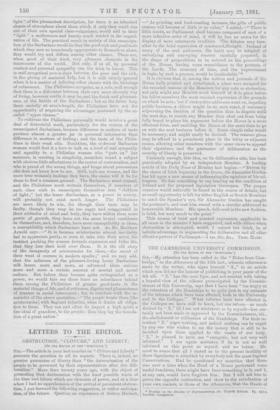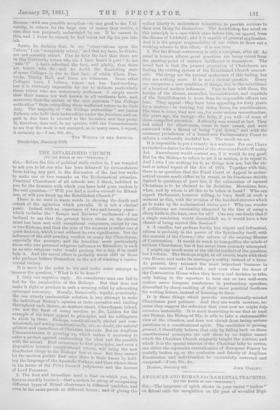THE CAMBRIDGE 'UNIVERSITY COMMISSION.
[To TDB EDITOR OF TIIE “SPECTATOR2']
SIR,—My attention has been called to the " Notes from Cam- bridge," in the Athena:um of the 15th inst., wherein reference is made by the writer, who signs himself "X.," to an article. which you did me the honour of publishing in your paper of the ult. " X." has the caw /ever, and not content with taking a hopeful view of the scheme promulgated by the Commis- sioners of this University, says that I have been " too angry at the retention of the Headships to be quite just in my estimate of the reforms which have been effected, both in the University and in the Colleges." What reforms have been effected in the Colleges we have still to learn, but one reform—as much desired by " X." (if I am not mistaken) as by myself—has cer- tainly not been made or approved by the Commissioners, viz., the abolishment or utilisation of the Headships. For their re- tention " X." urges nothing, and indeed nothing can be urged by any one who wishes to see the money that is still to be lavished upon them applied to • the wants of our body. " X." is pleased to term me " energetic, but not very well informed." I am again mistaken if lie is not as well informed on this point as myself, and no better. He must be aware that all I stated as to the present inutility of these dignitaries is admitted by everybody but the most bigoted *Conservatives. Had he questioned my assertion that there was once a time when the Head of a House performed some useful functions, there might have beeu 'something in it, and I, at any rate, would have forgiven him. But I will ask him to prove the opposite contention, and show to the satisfaction of your own readers, or those of the Athenanon, that the Heads of * Treatise on the Erection of Repreeentatives, fie. Fourth EWA= Pp. 253-4. Loudon : Longman'.
Houses—with one possible exception—do any good to the Uni- versity, in return for the large sum of money they receive, a sum that was purposely understated by me. If ho cannot do this, and I know he cannot, he had better not dip his pen into ink.
Again, he declares that, in my "observations upon the Tutors," I am " completely astray," and that my facts, ho thinks, are not correctly stated. Cau ho deny the fact that there arc in this University tutors who (as I have heard it put) " do not
tute ' P" I have admitted the fact, and gladly, that there are tutors who do—and no doubt the flourishing state of some Colleges is clue to that fact—of which Clare, Pem- broke, Trinity Hall, and Jesus are witnesses. Some other Colleges have, I believe, tutors not less hard-working, but it is obviously impossible for me to indicate particularly those tutors who are notoriously inefficient. I simply assert that their names are well known to all residents here, and, moreover, that the nature of the case prevents " the College authorities " from compelling these inefficient tutors to do their duty. The majority of " the College authorities " are junior Fellows, who hold their lectureships under the faineaiis, and ex- pect in due time to succeed to the lucrative and lazy posts. It, therefore, does rest, in my opinion, with the Commissioners to see that the work is not stamped, as in many cases, I repeat, it certainly is.—I am, Sir, &c.,







































 Previous page
Previous page